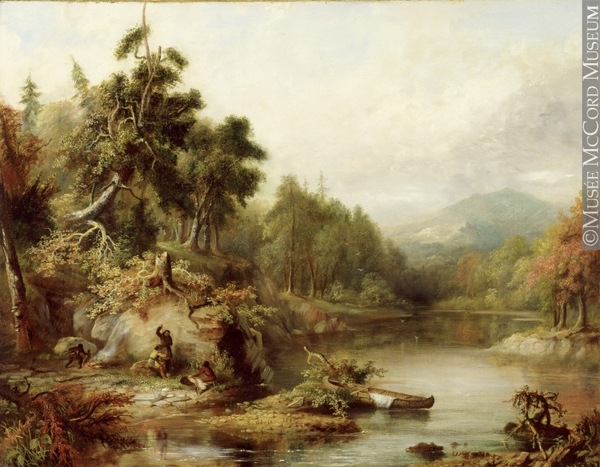
Source: Link
WHALE, ROBERT (Robert Reginald), painter; baptized 25 March 1805 at Altarnun, Cornwall, England, the son of Christopher and Grace Whale; m. in 1837 Ellen Heard, and they had five children including painters John Claude and Robert Heard; d. 2 July 1887 at Brantford, Ont.
Robert Whale demonstrated artistic talents, especially for portraiture, at an early age. The collections of local country gentlemen provided him with access to works by famous artists and he may have enjoyed the patronage of these gentlemen in the form of portrait commissions. Virtually self-taught, he reportedly copied many paintings at the National Gallery, London, and admiration for Sir Joshua Reynolds is evident in his work.
In 1852 Whale immigrated to Canada West with his wife and children; they settled in Burford, a village near Brantford. He did not lose any time in reestablishing himself as a painter, winning prizes for four paintings in the “Professional Category” in the Upper Canada Provincial Exhibition in the year of his arrival. He was a frequent exhibitor and prize-winner in these exhibitions until 1867, entering mainly landscapes, portraits, and animal subjects as well as some still-life, historical, marine, and non-Canadian studies. Whale did not sever his ties with England completely; he won a silver medal for a landscape sent to the international exhibition in London in 1862. His “A portrait of a lady” won 1st prize at the 1873 exhibition of the Ontario Society of Artists; three of his works appeared in the 1881 exhibition. That same year “A portrait of a lady” was presented at the second annual exhibition of the Royal Canadian Academy of Arts in Halifax, N.S. The following year Whale was listed as an associate of the academy at their showing and two of his portraits were displayed; works by him again appeared at their exhibitions in 1883 and 1886.
During his many years of painting, Whale, devoting himself totally to his art, travelled throughout western Ontario painting portraits and landscapes in Brantford, Hamilton, St Catharines, and at the Niagara Falls; he also made at least one trip to the White Mountains in New Hampshire. He completed numerous views of the Grand River area of Brant County as well as portraits of many of Brantford’s distinguished citizens, and he painted portraits of Sir Allan Napier MacNab*, Adam Brown, Sir George William Burton, and Charles John Brydges. Depending on his income from painting to support his large family, Whale sometimes had difficulty making ends meet. To augment his funds he created a panorama of the Indian Mutiny of 1857, complete with colourful narrative, which was exhibited across the province. J. Russell Harper describes it as “combined horror movie, television thriller, and news documentary.” Touring the county fairs, often in the company of his nephew and son-in-law, John Hicks Whale, who was an amateur artist, Whale participated in art competitions offering monetary prizes; apparently “the Whales monopolized all awards.”
In the summer of 1870 Robert paid a short visit to England with John Hicks Whale who reported to his wife Mary that “Artist” wore himself out painting portraits of friends, even to the point of neglecting to visit his sisters. Robert’s wife, ill during his absence, died in 1871 soon after his return to Canada. He went again to England shortly after, stayed until September 1876, and then lived with Mary in Brantford. There he continued to paint with his customary zeal.
Whale’s paintings, almost exclusively in oils, vary greatly in quality, largely because so many were executed quickly to raise money; a number were painted as favours for friends and many are unsigned. The same compositional devices recur and he repeatedly copied his most popular canvasses. Whale was reported to have done the first nude studies in the province but it is doubtful that they were ever exhibited. At his best Whale was a competent and sensitive portraitist, especially when the sitters were women and children. He was capable of the careful and skilful enrichment of facial features and adornments such as jewellery and lace. His career, however, illustrates the diverted ambition of many portrait painters in this period who were forced to produce marketable canvasses. Nevertheless, Whale’s views of southern Ontario and portraits of its inhabitants present an important historical record despite the uneven quality of the paintings themselves.
National Gallery of Canada Library (Ottawa), Documentation and biblio. file, Robert Whale. PAC, MG 28, 1126. Weekly Expositor (Brantford, Ont.), 15 Sept. 1876, 8 July 1887. Harper, Early painters and engravers. R. H. Hubbard, Canadian landscape painting, 1670–1930; the artist and the land . . . (Madison, Wis., 1973). Robert Whale of Brant: a preliminary survey; Glenhyrst Arts Council, the Art Gallery of Brantford, [comp. Mario Polidori] ([Brantford?, 1969?]). “Robert R. Whale, A.R.A., well-known artist,” Semi-centennial, 1877–1927; incorporation of the city of Brantford: the Brantford Expositor anniversary number (Brant ford, 1927), 129. A. H. Robson, Canadian landscape painters (Toronto, 1932).
Linda Belshaw Beatty, “WHALE, ROBERT (Robert Reginald),” in Dictionary of Canadian Biography, vol. 11, University of Toronto/Université Laval, 2003–, accessed November 28, 2024, http://www.biographi.ca/en/bio/whale_robert_11E.html.
The citation above shows the format for footnotes and endnotes according to the Chicago manual of style (16th edition). Information to be used in other citation formats:
| Permalink: | http://www.biographi.ca/en/bio/whale_robert_11E.html |
| Author of Article: | Linda Belshaw Beatty |
| Title of Article: | WHALE, ROBERT (Robert Reginald) |
| Publication Name: | Dictionary of Canadian Biography, vol. 11 |
| Publisher: | University of Toronto/Université Laval |
| Year of publication: | 1982 |
| Year of revision: | 1982 |
| Access Date: | November 28, 2024 |